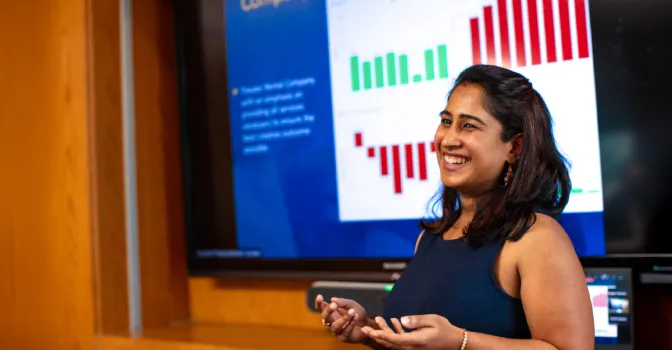
Putting Artificial Intelligence at the Center of the Classroom
The dramatic rise in artificial intelligence programs, including generative AI tools like ChatGPT, has yielded a great deal of excitement across industries, as well as uncertainty. Tech-industry leaders have been split on the issue — some diving in headlong, others urging a pause on further development, with a panicky few foreseeing doom — while those in creative professions fear that their work might be swept aside in favor of computer-generated art, writing or computer code.
There’s a different set of concerns in the higher-education setting: Professors might ask whether a student used ChatGPT to write a final paper and students might wonder whether an AI tool graded their exam. Individuals from both universities and industry speculate that entry-level jobs that recent college graduates once filled might be carried out by automation instead.
Embracing and Experimenting
Amid this environment of both innovation and tension, Assistant Professor of Management Daniel Albert, PhD, took a daring step: he embraced ChatGPT and integrated it into his courses at both the undergraduate and graduate levels.
During spring term, Albert fully integrated AI into two courses, Strategy and Competitive Advantage (MGMT 450), and Strategy Analysis (MGMT 520), making it compulsory for students to use ChatGPT in supplementary assignments and discussion and having students provide transcripts of their AI interactions. He then tracked all of the submissions that his students made, conducted analyses, shared the insights with his students to help them improve their use of AI for research and produced a white paper after the end of the term summarizing his experience.
Both Albert’s white-paper findings and feedback from students reflect that ChatGPT elevates student learning experiences and that oversight is crucial, as well as that AI can complement instructors and TAs, but not replace them — yet.
For courses focusing on innovation, it made sense to use new technology and to probe its limits, Albert says.
“Some students had already embraced the technology and others were hesitant and in need of some guidance. I wanted to offer them the tools for doing research and thinking about how we can become better decision makers. As professors, that’s what we’re here for, and I think the students were grateful for the experience.”
For these efforts, Albert received the Innovation in Teaching award from LeBow’s Center for Innovation in Teaching and Learning. He’s not alone among LeBow’s faculty in adopting this emerging technology, though: Professor and Department Head of Finance Ed Nelling, MBA, PhD, incorporated ChatGPT into his Intermediate Corporate Finance (FIN 302) during summer term.
Nelling sought to explore the tool’s strengths and weaknesses through initial, exploratory prompts. With what he called a few “low-stakes experiments” — not required but worth one point of extra credit on an assignment — he encouraged students to use ChatGPT to learn or practice material from the first two weeks of the course.
Handing off basic research tasks to ChatGPT, as if it were an intern, carries some risk: students and instructors alike should be sure to double-check any calculations that the tool completes. Nelling found that shorter, less quantitative prompts generated more accurate responses, while Albert found that careful prompts that instructs AI to synthesize, analyze and generate content is more useful.
With the sudden proliferation and adoption of AI tools, Albert says, “we all became managers overnight, so we have to learn to delegate work to and how to evaluate the work done by AI.”
Looking Deeper Into AI
A special-topics course taught during spring term complements this thread of AI exploration at LeBow.
Human Plus: AI and Decision Making (INDS T680) was devised by Murugan Anandarajan, PhD, senior associate dean of academic programs and faculty affairs and professor of decision sciences and MIS, and he co-taught the course with Marc Wintjen ‘98, BSBA in management information systems, risk analytics architect with Bloomberg, and Claire Simmers, PhD, professor emeritus of management at St. Joseph’s University.
While AI has been a component of prior courses in business analytics and in MBA-level courses on emerging technology, Human Plus was LeBow’s first academic course devoted completely to the subject. To guide students in exploring how artificial intelligence programs can improve business decision-making while also making a case for the importance of human intelligence to direct and influence those decisions, the course examined AI’s role in business from three perspectives: data, humans and machines.
As lead instructor, Anandarajan led sessions focused on machines, with Wintjen focusing on data and Simmers on humans. All three provided graduate students across LeBow’s MBA and MS programs with significant exposure to how AI models are designed and programmed, with students devising their own analyses and recommendations on where and how they might be implemented.
“It’s a topical area right now, and through the synchronous sessions and online discussions between classes, the students could relate the course material to what they’re seeing in the world today,” Anandarajan says.
In addition to delving into this growing field, the course also mapped out a new model for interdisciplinary courses and, through collaboration with LeBow’s Instructional Technology team, for online teaching at LeBow. Working with Director of Instructional Technical Services Alan Hecht, Anandarajan broke the course into modules, with each one linked to data, humans or machines, as well as to particular learning goals mapped out in the course syllabus.
Recorded lectures and accompanying slides were kept to shorter lengths, and collaborative discussions, prompted by stories in the media about ChatGPT and other AI technologies and facilitated by the online platform Yellowdig, helped reinforce topics and themes between sessions and throughout the term.
Between the cutting-edge subject matter and the revamped course structure, Anandarajan says, “there was an infectious enthusiasm shared by the students and instructors.”





